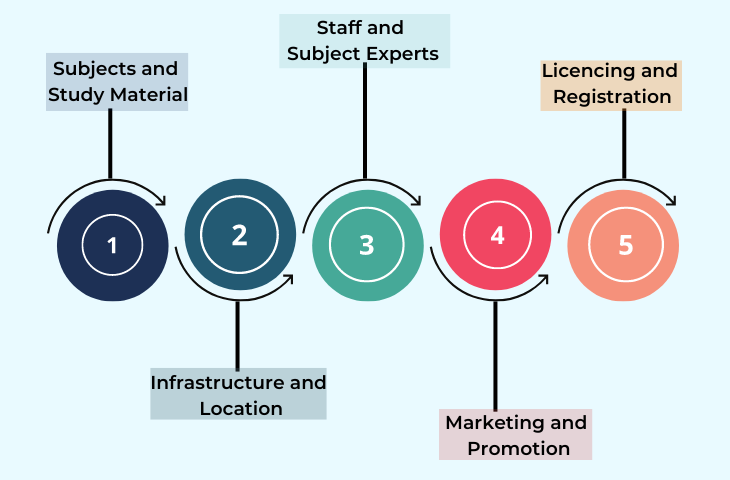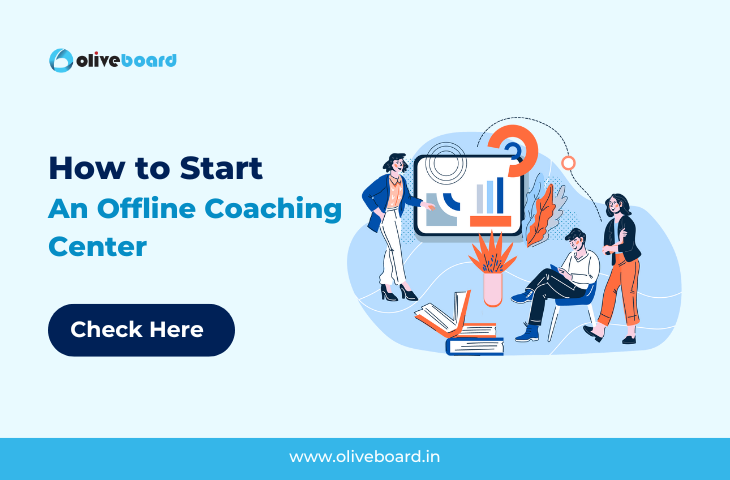How to Start an Offline Coaching Center: If you ask any kid from 16 to 22 to name a coaching center, you’ll get quite a long list. Some will be names you’ve seen in the newspaper every day, and others you may never have heard of. So can anybody simply start a coaching center for kids and hope to reach the newspaper feature level? Of course, it’s not that simple. If it were, newspapers would have less news and more coaching center ads.
A lot goes into an educational institution. It’s not enough to have instructors anymore. You need to build a brand, you need to give students incentives. Why should they choose you over countless others? And so Oliveboard brings this blog. We will provide a few broad tips and points to keep in mind when you begin your new venture. With these in mind, you can easily build a stable and profitable coaching center.
How to Start an Offline Coaching Center: The Process
Like with any venture, or for that matter any goal you set out to achieve, there is a process. For example, when you make tea there is a process. Boil water, and add tea leaves, milk, and sugar. All these have an order too. That’s how it goes for setting up an offline coaching center. Only the process is a lot bigger. And costlier than tea.
We will be breaking down the process of starting an offline coaching center into 5 steps:

1. Subjects and Study Material
If your to be coaching center is a building under construction, the subjects and the teaching material are your foundation. You should be clear on what services you want to provide and through what means. For education, the following are the more popular sectors right now:
- Engineering Entrance Exam Coaching
- Medical Entrance Exam Coaching
- Banking Exams
- IAS
- MBA
- CLAT
Spoken English, written English, personality development, and computer skills are a few others that are sought after in the coaching area. With the rise in social media, people also want to learn how to master the many platforms available. A number of people have started small businesses via YouTube, Instagram, TikTok, etc. If you are someone with experience in building businesses online, this could be a very lucrative area to capitalize on.
Once you’re sure of the services you want to provide, you have to set up the means to get the material that will help teach the subject you want to teach. In the case of entrance exams, each exam has multiple subjects to cover, especially the engineering and medicine exams. Make sure that you have quality study material that the students find easy to comprehend and dependable to study from.
2. Infrastructure and Location

It is imperative that regardless of size, the space where the students learn should be good for learning. This means good seating arrangements, proper spacing, sufficient lighting, and proper ventilation. Depending on the age group, putting up subject-specific graphics will be a great way to make the students like their study space.
When it comes to space, it would be a good idea to start small. Test out the waters and see the demand. Especially for engineering or medicine coaching centers, keep one room each for each subject and build on that. Expand the space with the demand and additional subjects or courses you may wish to add.
For the location, make sure to choose a place that is easily accessible to the students. In cities, this could be near the main area or at least near any transport stops. Ensure proper noise management. Students cannot study or concentrate on noise no matter the course. Also try and ensure the space is away from direct pollution.
Don’t forget to make provisions for cleanliness, distancing, and first aid.
3. Staff and Subject Experts
This is a vital point. You will need to recruit teachers and instructors for the subject you wish to teach. You will also need subject matter experts who will help prepare better material that will be used in teaching. LinkedIn and Internshala are prime sources of employment. Put out well-detailed advertisements stating your requirements, the job details, the compensation and perks that the employees can avail. Interview and determine how good of a fit they are for the job.
If you, yourself are a teacher, it would be best to start the center with your specialization subject. If you have partners who are also subject matter experts in different subjects, then it would be easier to diversify the institution. Either way, start small and then grow.
4. Marketing and Promotion

This is a huge part of the setting up process. It would be best to begin promoting in the initial days. This way, by the time you have the coaching center going somewhat stable, you can afford to put more toward marketing.
The Avenues
When it comes to marketing and promotion, it is essential to remember who your target audience is. If you’re aiming for classes from 10th to 12th, you have to curate your promotion towards not just the students, but also their parents, who will be the ones to actually pay. In this case, the following forms of offline promotion would work-
- Newspaper ads
- TV ads
- Posters
- Pamphlets
For online promotion, Facebook would be the target platform. Depending on your budget, you can also go for collaborative offers with nearby businesses, small billboards, etc.
When it comes to college students, graduates, and working professionals, social media is the best avenue to hit. Instagram story ads and promoted posts are one good way of getting a lot of users interested. YouTube ads are another way to promote your coaching classes.
Points to Remember
- Promoting on social media requires awareness of what it is that social media users like. You will have to study the use patterns of your target audience. If your classes are for skill enhancement, crash courses, and certifications, make sure to highlight the benefits of the same in your stories and posts.
- Create content that is appropriate to the platform. Instagram requires dynamic and engaging posts that make the user curious to know more. Information, statistics, and dry content will probably not gain much traffic.
- Instagram, YouTube, Facebook, and Twitter (if it survives) have algorithms that boost
- Original Content
- Hashtagged (#) content
- With images and/or videos
So it would be good to study these algorithms before planning your strategy to promote online.
5. Licensing and Registration
Coaching centers and institutes are recognized as educational business institutes. The scale of the legal procedures depends on the scale of the business itself.
- Small-scale businesses: If it’s a small coaching class in a limited residential area, a trade license and registration is not required.
- Large-scale businesses: Are required to get trade licensing and also pay taxes. In case the profit margin is more than 9 lakh rupees mandatory registration and tax payment is required.
Some Salient Points:
- The local municipal corporation grants the trade licenses.
- The application for the same should be filled out three months before opening a business.
- Documents required: rent bill, lease deed, consent letter from the building owner, affidavit/declaration, etc.
How to Start an Offline Coaching Center: Conclusion
This is the process of setting up your offline coaching center. Keep in mind that this is a guidebook and that the process will be time taking and require plenty of effort from you. It is not an easy thing to set up an educational business even a small tuition center. So make sure you plan everything well in advance and are sure of what you want to do before you start. That way your obstacles will reduce a lot.
Best of luck!
How to Start and Offline Coaching Center: FAQs
Anything can be easy or difficult depending on who is doing it. With enough effort, planning, investment, and business acumen, you can definitely start an offline coaching center. The planning and effort should be to keep it going.
The difference between a small-scale and a large-scale business depends on the following factors:
1. capital
2. resources
3. labor
4. investment
Large-scale businesses will always have more of all these factors. More capital is required, more resources are used, more labor, and more investment.
Offline coaching centers are mostly popular for entrance coaching and graduate-level exam coaching. It is also good for courses and certifications like AUTOCAD, programming, etc. You can even start coaching centers for spoken English, personality development, design, music, and more. It depends on you and your budget!
The amount of investment required for an offline coaching business depends on the infrastructure, the scale, the subject, and the location of the classes to name a few factors. It would be best to set aside at least a lakh or so for a coaching center with rented classes.
